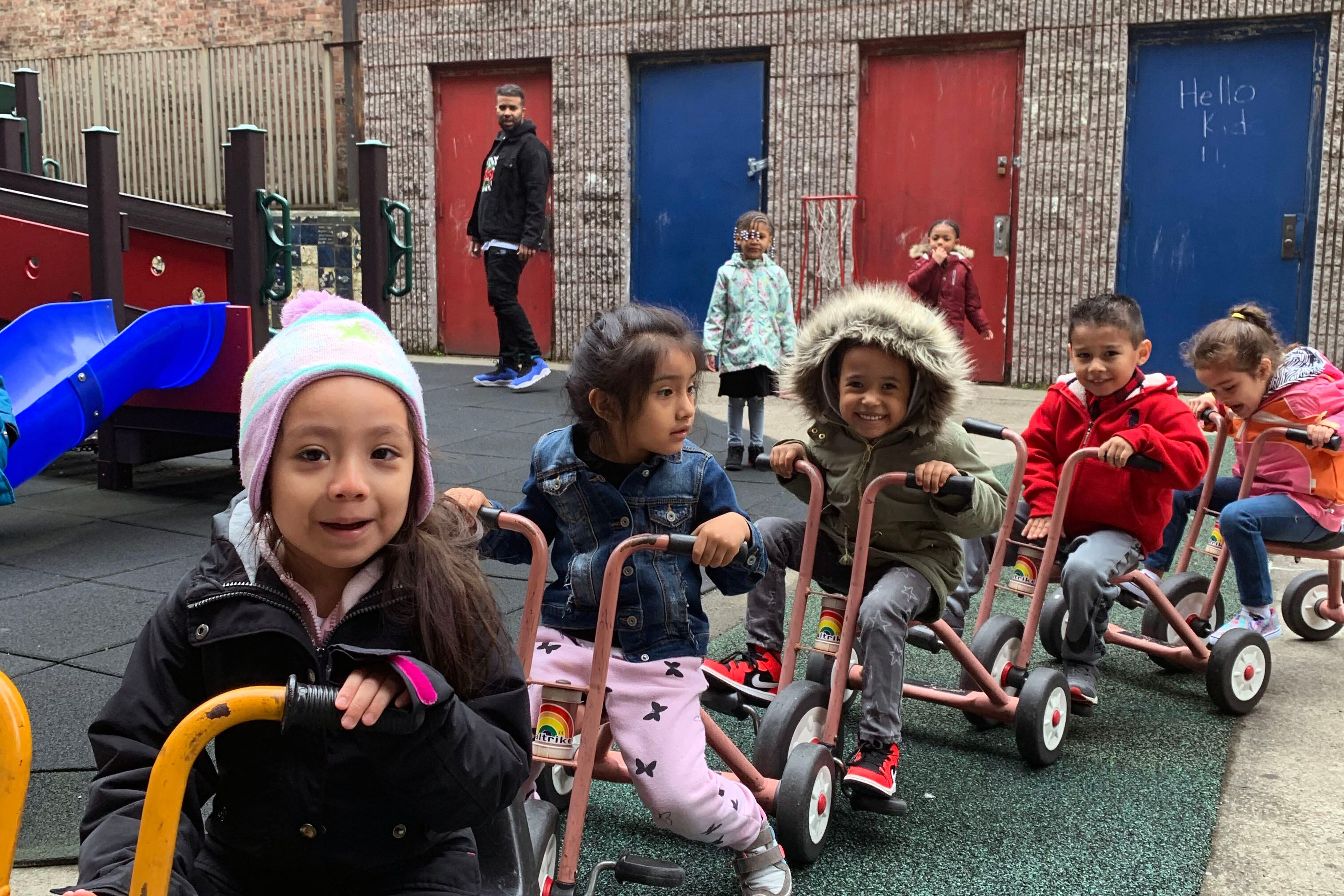When migrant families began arriving two years ago, Hudson Guild, a long-time preschool operator on Manhattan’s West Side, became a popular child care choice for those staying in nearby emergency shelters.
The operator had plenty of open seats because of prekindergarten enrollment losses during the pandemic, and it ran several publicly funded preschool programs that were free and open to undocumented families. Before long, as many as 70% of the seats in some of Hudson Guild’s programs were occupied by the newcomer students, according to administrators.
“It was a great partnership, because we were able to offer safe, nurturing educational classrooms,” said Joanny Ruiz, the director of early childhood services at Hudson Guild. “Parents were really appreciative and open to the work that we were doing.”
But that arrangement was upended when a new city rule limiting shelter stays for migrant families to 60 days began to take effect, Ruiz said. As many as 50 of Hudson Guild’s roughly 200 families have dropped out over the past several months, while others are now making long daily commutes and struggling to keep up their attendance, she said.
“It was a huge disruptor for our work,” Ruiz said.
While the impact of the 60-day rule on K-12 schools and students has received some sustained public attention, the effects of the policy on pre-K students and programs have often been overlooked. The policy’s impact on the early childhood sector is the subject of a new report from United Neighborhood Houses, an organization that advocates on behalf of city-contracted early childhood education providers.
Many of the fundamental challenges described by early childhood providers in the report echo those faced by school-age students and K-12 schools — particularly the difficulty for kids and families of having to leave schools where they’d grown comfortable, or add long commutes to their daily schedules.
But early childhood providers pointed out that the disruption of midyear schooling changes can be even more pronounced for the youngest kids. And because preschool enrollment is not mandatory, there’s a greater chance that kids forced to leave their programs midyear may simply not re-enroll and remain at home.
Teachers also had to switch up their curriculums midyear, rebuild relationships, and reset their classroom expectations as large numbers of kids left and new ones arrived, Ruiz said.
“To be honest, a lot of the work that I’ve been doing was just self-care for my teachers,” Ruiz said. “They were feeling burnt out. The revolving door of children coming in and out, it felt like it was September and October all year long.”
There are also operational challenges of dealing with the fallout of the 60-day notices specific to early childhood programs, the report found.
While K-12 schools, for example, are eligible to receive MetroCards to distribute to homeless families to help with their commutes, preschool operators have gotten mixed messages about MetroCards, according to the report. Ruiz, of Hudson Guild, said she was able to obtain some MetroCards from the city Education Department, but it took a long time.
“Not all providers have been able to get MetroCards,” said Irene Lew, a senior research analyst at United Neighborhood Houses, and author of the report. “There’s been inconsistency there.”
An Education Department spokesperson said the agency is working to get early childhood education providers MetroCards.
“We have messaged to [Early Childhood Education] providers and families that children have the right to stay in the program that they are currently enrolled in, and we also provide support for families who choose to transfer,” said spokesperson Chyann Tull.
The funding structure for preschool programs has also magnified the disruption of the 60-day policy, according to the report. Child care operators in city-funded programs are supposed to regularly submit invoices and are reimbursed based on their current enrollment.
When enrollment fluctuates dramatically in the middle of the school year, it can be hard for programs to forecast how much money is coming in and plan their budgets, the report found.
Adding to the challenge is the fact that enrolling new students often requires documentation and medical records that migrant families don’t have at their fingertips, leading to delays in kids signing up and programs getting reimbursed, according to the report.
Ruiz noted that on several occasions, by the time a student’s enrollment cleared the backlog, they had already dropped out.
For migrant families with kids ages 2 and under, the options are even more scarce. There are no universal city-funded child care programs for such children, and undocumented families aren’t eligible for the city’s largest child care voucher program for low-income families.
A new voucher program called Promise NYC for undocumented families launched last year for 600 students, but the funding of the program was not included in Mayor Eric Adams’s executive budget for next year.
At a City Council hearing earlier this month, Office of Management and Budget Director Jacques Jiha called the program “very important.” He said the administration will have discussions with the council about whether to restore the program in the adopted budget, which must be approved by the end of June.
Michael Elsen-Rooney is a reporter for Chalkbeat New York, covering NYC public schools. Contact Michael at melsen-rooney@chalkbeat.org.







